Archives
AND MORE...

"Shut Up" Or Make Peace
_____________________

Equal Opportunity Bombers
_____________________

Female Terrorist Hosts TV Talk Show
_____________________

Fatimah's New Spring Line
_____________________
August 9, 2020
Those Israeli Women
A fascinating piece (see below) about four Israeli women, with very different backgrounds, who have "broken new political ground".
Their individual stories are fascinating, and very uplifting to see how they're integrating within Israeli society.
The Washington Post | August 7, 2020
Four Israeli Women Who've Broken New Political Ground
They are an Ethiopian-born minister, an ultra-Orthodox Jewish lawmaker, a Druze lawmaker and the first Knesset member to wear a hijab
By Ruth Eglash
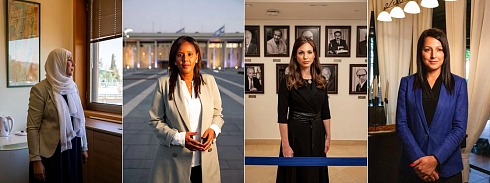
From left: Iman Khateb Yassin, Pnina Tamano-Shatta, Omer Yankelevitch and Gadeer Kamal Mreeh. Each of these four newly elected women represents a different sector of Israel's society. (Sharon Pulwer for The Washington Post)
JERUSALEM — One was 3 years old when she trekked out of her remote African village with her parents, ultimately bound for Israel, and another had to break loose of the strictures of her insular ultra-Orthodox Jewish world. A third had to win over the spiritual leaders of her community, and the fourth has endured a stream of insults and other abuse as a conservative Muslim wearing a headscarf.
All of these women have overcome daunting barriers to become groundbreaking members of Israel's parliament, called the Knesset.
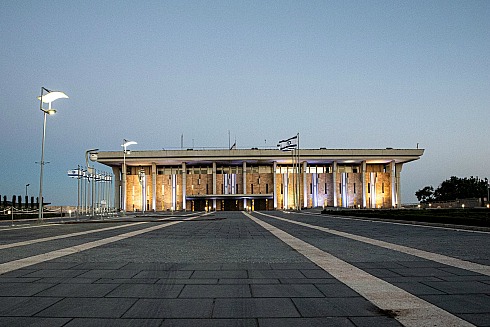
The building of the Israeli parliament, or Knesset. (Sharon Pulwer for The Washington Post)
Thirty-three of the Knesset’s 120 members are women. And while this is not the most ever, the number includes some impressive firsts: the first Ethiopian-born Knesset member to become a government minister, the first female ultra-Orthodox Jewish lawmaker and minister, the first female Knesset member from the Druze religious community, and the first to wear a Muslim hijab.
Israel is known for its iconic female prime minister, Golda Meir, but Gayil Talshir, a political scientist at the Hebrew University of Jerusalem, said Israel has become more conservative in recent years. The central role played by ultra-Orthodox Jewish parties, which do not run women for elective office, has made the political landscape challenging for women, Talshir said.
Each of these four newly elected women represent a different sector of Israel’s society, and three of them had to look beyond the parties that traditionally represent their sectors, finding a political home instead in the Blue and White party headed by Benny Gantz, now the country’s defense minister and alternate prime minister.
Here are their stories:
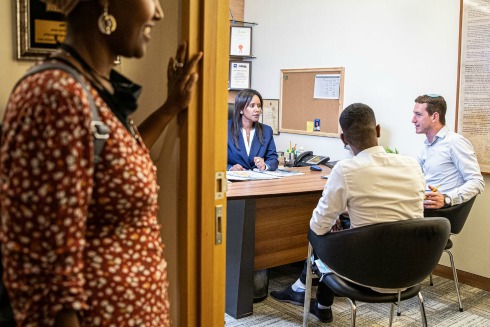
Pnina Tamano-Shatta, the first Ethiopian-born Knesset member, speaks with visitors in her office. (Sharon Pulwer for The Washington Post)
Pnina Tamano-Shatta
Pnina Tamano-Shatta, 39, who has served in the Knesset since 2013, made history in May when she became the first government minister born in Ethiopia. A week later, the newly appointed minister of immigrant absorption attended the annual memorial ceremony for Ethiopian Jewry.
“I stood there looking at the monument for those who died trying to reach Israel and realized that to get to this point, to become the first Black minister in Israel, is an incredible honor, not only for me but for my entire community,” Tamano-Shatta said.
She was 3 years old when her family left their village in Ethiopia and spent months hiding their Jewish identity in a refugee camp in neighboring Sudan. They were secretly airlifted to Israel in a military operation in the 1980s. Gantz, a former army chief of staff, was among those involved in the delicate mission that rescued thousands of stranded African Jews.
“He was there at the most critical point in my life, and his connection to the community is very meaningful,” Tamano-Shatta said. “Now he’s appointed the first Ethiopian as a minister.”
Tamano-Shatta faced sharp criticism for following Gantz into Prime Minister Benjamin Netanyahu’s government and becoming a minister. But she says the new role offers her the chance to address two issues close to her heart. She has a platform to speak out against discrimination, particularly against Israel’s 150,000-member Ethiopian community, and she can help new immigrants as they arrive in Israel.
“I know what it’s like to make aliyah,” she said, using the Hebrew term for immigrating to Israel. “My new challenge is to be a minister for every new immigrant that arrives in this country.”
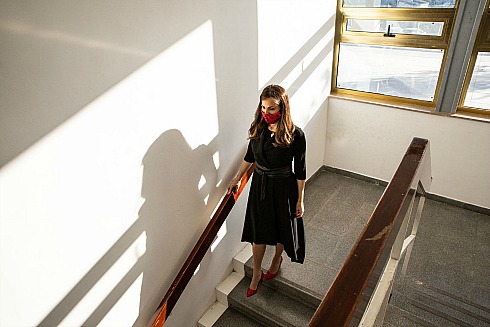
Omer Yankelevitch, Israel's first female ultra-Orthodox minister, walks through the Knesset building. (Sharon Pulwer for The Washington Post)
Omer Yankelevitch
Change is slow in Israel’s ultra-Orthodox community, which strictly adheres to Jewish religious law and long-held traditions, particularly regarding women. In recent years, however, a small but growing number of women in this community, known as Haredim, have demanded a voice within the existing political structure.
For Omer Yankelevitch, 42, a lawyer and community activist, finding a place in ultra-Orthodox politics was less important than pushing a social agenda that includes fighting for the rights of the underprivileged.
“I don’t feel that I’m a representative of the Haredim; they already have some excellent leaders,” Yankelevitch said. “I come with a social welfare agenda because I want to help the country’s minorities.”
Yankelevitch, also on the Blue and White ticket, was elected to the Knesset and became the minister of diaspora affairs, running the office that connects global Jewry and Israel. (She was first elected to the parliament last year, but neither Netanyahu nor Gantz could assemble a majority coalition, forcing the country back to two more elections before the government was finally able to get down to business this spring.)
Her new role has already caused a stir. Recently, she was photographed meeting with Haredi mayors, and the image of a woman meeting a group of ultra-Orthodox men sent shock waves through the community.
“The Haredi public is very conservative, and I don’t want people thinking that change is being forced on them,” Yankelevitch said. “I can understand their criticism. What they fear is change, and this needs to be a process.”
Yankelevitch said that what has hurt her most since entering politics is criticism from the general population.
“At the end of the day, I am an ultra-Orthodox woman from a secluded society, and the path I took to get here was very complex,” she said.
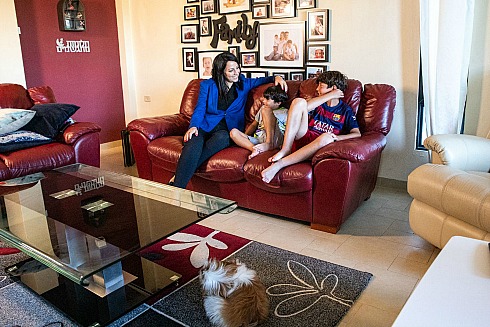
Gadeer Kamal Mreeh, the first Druze woman to hold a seat in the Knesset, spends time with her two sons at home. (Sharon Pulwer for The Washington Post)
Gadeer Kamal Mreeh
Gadeer Kamal Mreeh, 36, made history in 2017 as the first non-Jewish woman to anchor an Israeli news broadcast. It took her two more years to be elected as the first Druze woman in the Knesset.
“The Druze community is very conservative and patriarchal. That’s why we’ve not had any women in politics until now,” Mreeh said. “On the other side, no political party ever asked a Druze woman to join them. No one said, ‘We want to hear your voice.’ ”
Through her short stint in politics, Mreeh has already had to battle for her place — first with the community’s spiritual leaders, who were initially uncomfortable having a woman in a position of influence, and then with Gantz, who shocked supporters by forming a government with Netanyahu. She left his party for the opposition.
“My breaking point was when I understood that Gantz was not going to do what he promised,” said Mreeh, who entered politics with the aim of revoking a controversial nation-state law, a measure strongly backed by Netanyahu that highlights Israel’s identity as a Jewish country at the expense of minority groups such as the Druze.
The Druze, who practice an ancient, esoteric monotheistic religion incorporating elements of all Abrahamic religions and several other philosophies, are loyal to the state in which they are born. In Israel, the men serve in the military.
“I covered the protests against the law, and as a journalist I tried to remain neutral, but I really wanted to scream and cry out ‘What are you doing?’ Mreeh recalled. “When Gantz first approached me, I told him that my goal was to fix the law and achieve equality for all minorities.”
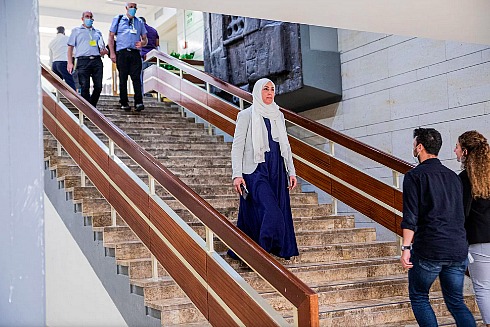
Iman Khateb Yassin is the first hijab-wearing woman elected to Israel's parliament. (Sharon Pulwer for The Washington Post)
Iman Khateb Yassin
Iman Khateb Yassin, 55, was chosen to run for the Knesset by her party, the Islamic Movement, beating out several men for the chance, and when she was elected last year, she became the first lawmaker in the parliament to wear a traditional Muslim head covering.
“Hijab-wearing women should not be viewed with suspicion; we should be respected for the way we dress,” Yassin said. “Today, in Israel, there are many Arab women, with and without a hijab, in many different fields — law, medicine. It’s natural that we should be involved in politics, too.”
But Yassin, a social worker by training, said it took time for the Islamic Movement to realize it needed to include a woman on its slate.
“Many conservative and religious Arab women — and men — realized that now was the right time,” she said. “After years of exclusion and stigma experienced by veiled, conservative women, after years of being told we can’t be included in political decisions, it was important for us to be represented.”
It hasn’t been painless. Yassin said she has faced online abuse, including comments telling her to “go back to the kitchen” or asking if she would prefer to share a recipe rather than a political opinion. Recently, her personal cellphone number was leaked, and she endured a stream of abusive phone calls that focused on her being a woman and an Arab in Israel.
“There will always be such voices, and it is bothersome, but not to the point that I will stay home,” she said. “I won’t stop operating. I know that I am setting an example to other Arab women.”
Photo editing by Chloe Coleman. Design by Tara McCarty. Copy editing by Paola Ruano.
Original article here.
Log In »
Notable Quotables
"Mr. Netanyahu is one of the most media-savvy politicians on the planet. On Friday he appeared live via video link on 'Real Time with Bill Maher,' taking the host’s alternately sardonic and serious line of questioning with gazelle-like alacrity."
~ Anthony Grant, jourrnalist who has written for many major newspapers and worked in television at Paris and Tel Aviv, interviewing former PM Benjamin Netanyahu on Monday, at the outset of Mr. Netanyahu's new book (more here).


